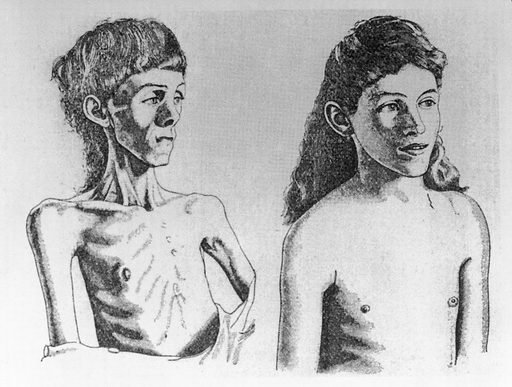Food Disorder - Explaining Anorexia Nervosa and Bulimia Nervosa to You
It is so surprising how much people do not know about health-related topics. I was having a chat with a group of guys today, we were actually discussing weight loss and weight gain. These people are not health professionals, they span from different professions including fashion designers, engineers, sports analysts, podcasters, and two other people who are basic school teachers. While we were having our chat as we often do on Fridays after work, our discussion diverted toward Eating disorders, and while I was expecting them to say something on the topic even in layman's terms, they asked if there was anything like an eating disorder.
I was shocked, but then I had this thought that most people do not even know about a particular illness, disease, or disorder unless they have to face it firsthand or know who was diagnosed with such. You see, I hear this "please can you explain in simpler words" a lot from people who aren't medical practitioners, or healthcare professionals. Anyways, I decided to explain food disorders to them in a very simple and short way, but in this post, I will be explaining food disorders a little more extensively.
When we talk about eating disorders, it has to do with eating quite alright, but it does not have to do with food, rather it has to do more with psychological problems. Bulimia Nervosa and Anorexia Nervosa are two eating disorders that are common among people with eating disorders. The prevalence rates of anorexia nervosa can be found in about 4% of females while in males, about 0.3%, in the case of Bulimia Nervosa the prevalence rate can go up to 3% in females and about 1% in males.
With Bulimia, there are uncontrolled episodes of Binge eating where a person eats a lot of food at once and then decides to not add weight thereby causing the person to begin self-induced purging, vomiting, use of laxatives, and diuretics to get their desired result. They are majorly concerned about bad body image, leading to the overly excessive desire to lose weight. If we are to look at it well, why will someone eat a large amount of food, only to start compensatory behaviors? It is common to find people who suffer from Bulimia have deteriorating teeth and gum (dental erosion) as a result of the acid from the vomit. They also have scaly skin and do not become excessively fat or lose weight. When it comes to intervention for Bulimia, it s best to monitor patient is about 1 to 2 hours after meal, the monitoring can also encompass looking for hidding binging and purging such as in disposed laxative boxes, and hidden trashed food wrappers. When this is done, checking for food electrolyte imbalance in cases of hypokalemia.

https://www.lookandlearn.com
In the case of Anorexia Nervosa which is the opposite of the eating pattern of Bulimia Nervosa but they want to archieve the same goal. With this, I mean that the patient is scared of eating because they do not want ot gain weight, making them not eat. This causes the patient to have distorted body image since they are suffering from starvation. You see, that this would actually be a pdychological problem. Actually, this is common with ladies in their adolescent or ladies in their youth with the ambition of becoming a model or with the claim of being a fashionista. Their fear is obesity and this disease is the leading cause of death in all mental health disorder as people who suffer from Anorexia are prone to commit suicide. These people see themselves as overwieght even when they are not overweight. They end up starving themselves which would lead to malnutrition. They tend to take diet supplement, laxatives after trying to eat very little, and they do vigorous exercise. They tend to lose more than 75% of their actual expected weight they do ot want to be, and 25% below the normal weight because of their fear for being overweight, they tend to lose electrolytes in their fluid and in case of low potassium leading to hypokalemia which can cause cardiac dysrhthmias, in severe cases of malnutrition as a result of not eating, patients could experience lanugo (a case of thin hair), in females they experience Amenorrhea (which is a case of no menstration), patients feel cold at all the time, since there is not enough metabolism in the body causing lower heat production, and finally, they also have low vitals which has to do with low blood pressure, and low temperature. Patients with Anorexia usually show signs of physiological problems before mental, so it is important to quickly treat the physiological problems in the short term before treating the mental problem. Patients with Anorexia should be monitored on a one-on-one base so as to be sure of them eating and gaining weight gradually. It is important to also state that this patients tend to freak out when they start to gain little weight during the process of treatment. At this point, they are now losing their mntal control and here it is important to deal with the psychological part of the disorder.
Conclusion
I am sure I have been able to explain eating disorder in a way that you would understand, I have also been able to discuss two types of eating disorder where the patients are concerned about gaining weight, but while Bulimia Nervosa has to do with binging and self-induced way of eliminating the food from the body, while Anorexia Nervosa has to do with the fear of weight gaining but this time, the patient isn't eating, thereby causing malnutrition. Thanks for reading, I hope to have you on my blog again next time.
- https://www.ncbi.nlm.nih.gov/pmc/articles/PMC8500372/
- https://www.nimh.nih.gov/health/publications/eating-disorders
- https://kids.frontiersin.org/articles/10.3389/frym.2020.545034
- https://www.ncbi.nlm.nih.gov/pmc/articles/PMC4117136/
- https://www.ncbi.nlm.nih.gov/pmc/articles/PMC1857759/
- https://www.ncbi.nlm.nih.gov/pmc/articles/PMC5757497/
- https://www.statpearls.com/ArticleLibrary/viewarticle/74185

The surprising part is they don't even know what they are doing is gradually killing them, most of the time.
Thank you for this post, it was very insightful.
These is often a psychological problem most times, and these people always end up worrying about their shape, how they want to be one size or the other, how they are yet to get to the size they want to be, and so on. For me, it is the paranoia when treating them and they start to eat, they begin to complain, feel unrest, worried that they are becoming bloated, and so on. At this point, it will require the help of a psychiatrist else it could lead to suicide.
Thanks for reading.
Many people have unhealthy relations to their bodies. This is especially true in a society obsessed with image over substantive health.
I suspect that many people have a combination of disorders. It can also be difficult to tell unhealthy behaviors from good behaviors.
Many people practice fasting. Fasting is not anorexia. Some people with healthy metabolisms eat and expell a huge amount food.
I seem to have a slow metabolism.
Discussing the issues helps people differentiate good health from bad health.
PS: sharing WINE a day is generally a good thing as it fills one's HE account with precious WINEX tokens.
!WINE
Congratulations, @irivers You Successfully Shared 0.100 WINEX With @elity-sitio.
You Earned 0.100 WINEX As Curation Reward.
You Utilized 1/1 Successful Calls.
Contact Us : WINEX Token Discord Channel
WINEX Current Market Price : 0.224
Swap Your Hive <=> Swap.Hive With Industry Lowest Fee (0.1%) : Click This Link
Read Latest Updates Or Contact Us